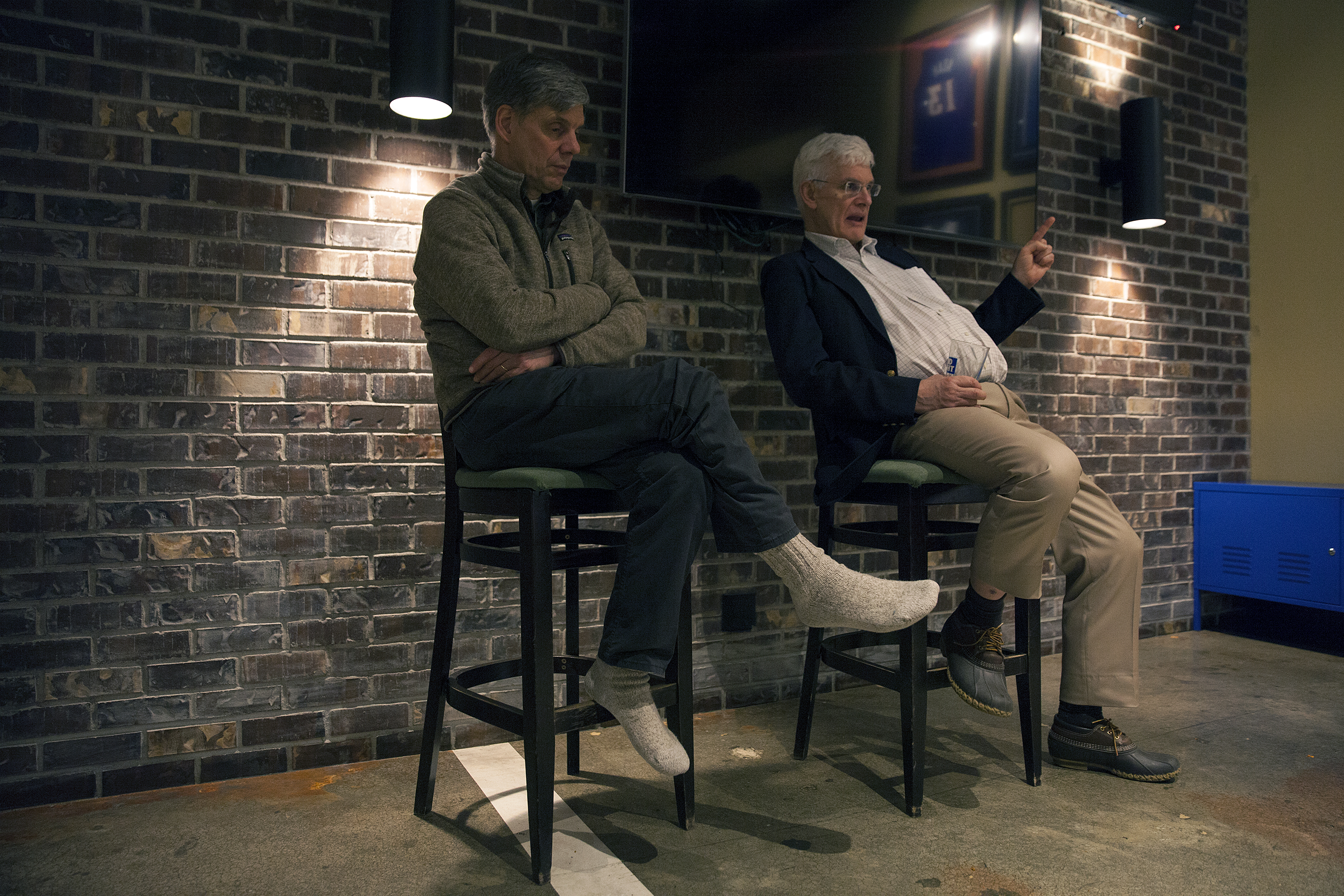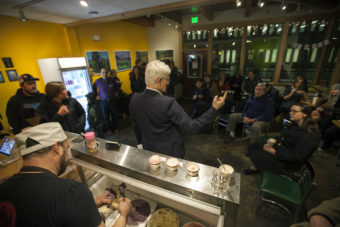
This story is by both Elizabeth Jenkins and Rashah McChesney for Alaska’s Energy Desk.
The Alaska legislature has a lot on its plate trying to fix the state’s multi-billion dollar budget deficit, and a couple of budget experts are adding to the menu. They’re inviting the public to weigh-in over ice cream and beer.
More than 20 people are crowded into Coppa — a local ice cream shop in Juneau — to learn about what’s happening with Alaska’s budget. People dig small plastic spoons into flavors like “fiscal crunch” and “sustainable blueberry budget.”
Carole Triem is here with a friend. And while the ice cream doesn’t make the fiscal situation taste any sweeter, she said her main reason for coming is to learn.
“I feel like I should know more about the budget than I do. Especially as a state employee because it affects my livelihood,” Triem said.
Jobs like Triem’s could be on the chopping block, as the Alaska legislature looks at ways to reduce state spending. There’s a more than $3 billion hole to fill this year, and with declining oil production and weak revenue, Cliff Groh said we can’t keep living like we have.

Groh is the chair of Alaska Common Ground, a public policy nonprofit and a former assistant to the commissioner of the Department of Revenue. He’s here presenting with Gunnar Knapp, an economist. You could say Groh’s role is to simplify the jargon of the budget crisis. That’s his mission.
“Alaska’s in deep kimchi and all the bland food options have left town,” Groh said. “The choices are spicy and not the easy meatloaf and mashed potatoes. People need to think clearly about the difficult choices we face.”
Groh said that means the options to fix Alaska’s budget are not that appealing: deep cuts to state infrastructure, creating a state income or sales tax, repealing the oil and gas tax credit program. We can’t just pick one.
“But those are the kinds of choices that Alaska faces now because the savings are running out very fast,” Groh said.
Groh said we’re eventually going to have to eat our kimchi. He and Knapp give this same spiel to their audience for a over an hour. After everyone leaves, they make their way over to McGivney’s where they’ll do it again.

In a back room at the downtown sports bar, Knapp and Groh pick up their informal budget conversation with an after-hours crowd. They aren’t shy about telling other people to get comfortable.
“By the way, those who just came in, get some beer, there’s beer, enjoy the beer,” Knapp tells a crowd of about 15 people.
Knapp kicks off his shoes and reclines on a bar stool while giving the crowd a broad overview of the budget. The state’s dependence on oil money has left lawmakers reeling — trying to figure out where to cut and how deep. So far, Knapp said, they’ve been relying on savings.
The crowd is a mix of lawmakers, legislative aids, community members and even a former Deputy Commissioner of the Department of Revenue. And while the conversation is relaxed, they’re grappling with some difficult concepts. A woman in the crowd asks if we’re all screwed. Should she stick it out or leave the state?
“I mean, I’m fundamentally an optimist about Alaska,” Knapp said. “And I think that we’ve got a lot of resources, there’s a lot of oil still in the state.”
It’s those same concepts that lawmakers struggle with by day at the state capital just a few blocks away. Groh says the competing philosophies of cutting further, capping spending, taxing Alaskans and dipping into the Permanent Fund, make it difficult for for legislators to work together.
“And Alaska’s political situation surrounding the fiscal problems are sort of like what you might see in an old spaghetti western or Quentin Tarantino film,” Groh said.
A standoff.
Groh said Alaskans have been very good at announcing what they don’t want. Now they need to think about what they will accept. And sometimes a scoop of ice cream or a swig of beer can help that reality go down easier.
Correction: This story previously stated that Cliff Groh was a former Commissioner of the Department of Revenue. He was a former assistant to the Commissioner.
Rashah McChesney is a photojournalist turned radio journalist who has been telling stories in Alaska since 2012. Before joining Alaska's Energy Desk , she worked at Kenai's Peninsula Clarion and the Juneau bureau of the Associated Press. She is a graduate of Iowa State University's Greenlee Journalism School and has worked in public television, newspapers and now radio, all in the quest to become the Swiss Army knife of storytellers.




